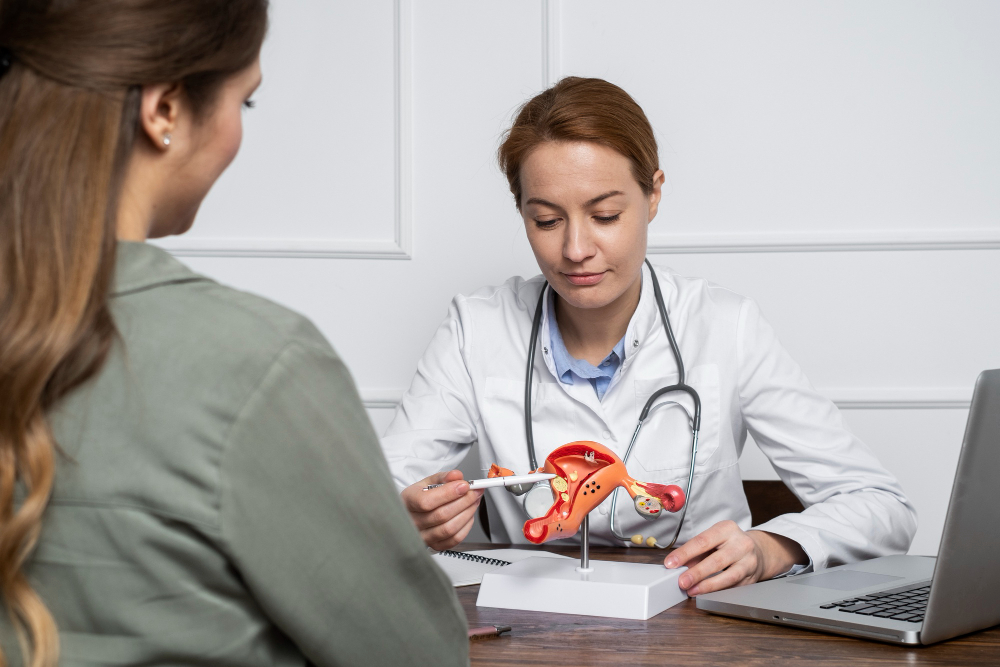Endometriosis is an often debilitating condition with many physical symptoms that can affect daily life. It is important to remember that you are not alone in your struggle and to reach out for help if you are experiencing painful endometriosis-related symptoms.
Proper treatment makes it possible to manage this condition and lead a healthy life. If you or someone close to you has endometriosis, seek medical advice immediately.
Maintaining good communication with your healthcare provider is essential, as it will help them understand your needs better and manage your condition accordingly. Additionally, incorporating lifestyle changes such as stress management techniques, a healthy diet, and regular exercise can also be beneficial for managing symptoms related to endometriosis.
8 Symptoms of Endometriosis
The primary symptom of endometriosis is intense pelvic pain that typically occurs during menstrual periods. While many people experience menstrual cramps, those with this condition often report significantly more severe menstrual pain. Additionally, the intensity of the pain may worsen over time.
Some indications of endometriosis that are commonly observed are:
Painful or Irregular Periods
One of the most common symptoms of endometriosis is painful or irregular menstrual periods. Individuals who have endometriosis may encounter pain that is more intense than regular menstrual cramps. Symptoms like vomiting, diarrhea, nausea, headache, fatigue, and fever may accompany this pain.
Excessive Bleeding
Excessive bleeding between periods is one of the symptoms of endometriosis. Periods also become heavy and prolonged. This can be caused by an increase in the levels of hormones that stimulate uterine lining growth, leading to heavy and prolonged menstrual cycles.
Treatment for this symptom may include hormone therapy or surgery. Some women may also experience spotting in between menstrual cycles. This can lead to anemia due to the loss of blood.
Bloating or Endo Belly
Some women with endometriosis experience bloating, abdominal distention or “endo belly.” This symptom is most common during menstrual cycles and can cause discomfort.
Abdominal Pain
Women with endometriosis experience abdominal pain that may be persistent or worsening during their menstrual cycles. This pain is often described as a deep, sharp, and stabbing sensation lasting several days.
Gastrointestinal Issues
Women with endometriosis may experience constipation, diarrhea, bloating and gas symptoms. This can be caused by the inflammation associated with the condition, leading to cramping and discomfort.
Reduced Fertility or Infertility
Endometriosis can cause reduced fertility or infertility in some cases. Women with endometriosis may have difficulty conceiving due to the scarring and inflammation associated with the condition. Endometriosis can cause adhesions, scar tissue that binds organs together and blocks the fallopian tubes.
The condition can cause hindrance to the movement of an egg from the ovary to the uterus and prevent a fertilized egg from implanting in the uterus. It is recommended that women seek treatment for endometriosis if they are trying to conceive, as leaving it untreated can increase their risk of infertility.
Pain with Intercourse
Endometriosis can result in pain during sexual activity due to inflammation and scarring associated with the condition, particularly in women. This can cause frustration, fear, and sadness for some women. It is essential to talk to your doctor about this symptom, as there are treatments that can help reduce or eliminate it.
Other signs and symptoms
It may include fatigue, painful urination, depression, and pain in the lower back or pelvic area.
Conclusion
Endometriosis can be treated through various methods, including hormone therapy, surgery, or lifestyle changes. It is essential to talk to your doctor if you are experiencing any of these symptoms, as they can help determine the best course of action for treating your condition.
It is a condition that affects many women and can be managed with the proper treatment. With the right care and support, reducing or eliminating the pain associated with endometriosis is possible.
Most importantly, remember that you are not alone in your struggle – resources are available to help you manage your endometriosis and live a healthy and happy life. Seek help and take of your body and health.

